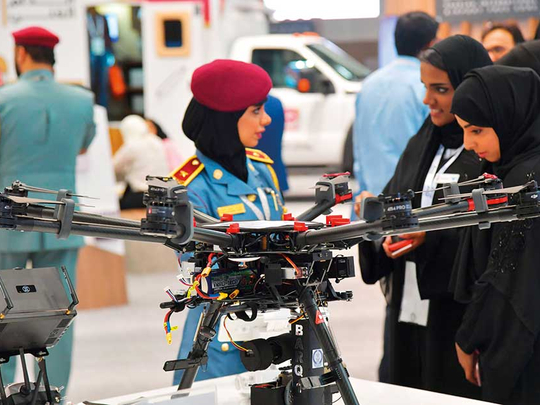
Dubai: The rise in incidents involving drones around airports has seen a marked rise in the sale of defensive and offensive technologies to deal with drones, according to a company involved in such systems.
“We need to separate threats in to two sections: idiots, and bad guys,” said Robert Fintak, CEO of Advanced Protection Systems (APS), a drone detection and neutralisation company.
These idiots, Fintak said, were simply “stupid people using drones close to airports.”
Bad guys, on the other hand, were using drones to create a “catastrophe,” he told Gulf News in an interview at Gitex this week.
Having grown “exponentially” over the past few years, APS’s clients are now mostly in the realm of critical infrastructure, including airports, power plants, water plants, atomic plants, and governmental buildings.
“The market is huge,” Fintak said, adding that increasingly, prisons were becoming a bigger source of revenue for the company, as friends and relatives of inmates attempt to fly contraband such as illegal drugs and mobile phones into the prison via drones.
According to the UK’s Press Association, criminals on the outside used drones to get contraband over prison walls 33 times in 2015, compared with just two times in 2014 and none in 2013.
In November 2016, the UK’s Ministry of Justice said that it had seen a “big increase” in the number of reported drone incidents involving prisons over the last year.
“Since last year, we’ve recognised that many prisons have problems with drones, with people trying to smuggle banned things in,” Fintak said.
According to Fintak, one new market he is trying to tap into in the Gulf is private estates, such as palaces.
“No one wants to be recorded, particularly [the high net-worth individuals] in this region,” he said.
The CEO said that many of his client’s preferred Poland-based APS to its more expensive competitors in the UK or the US, and he saw plenty of potential for the company’s technology in the security-conscious Middle East.
“We are having many great talks every day at Gitex,” Fintak said, adding: “[We are in advanced talks with] a local company, a leading security integrator, and he wants to be our distributor.”
Fintak declined to specify which company it was that APS was in talks with.
SafeSky, APS’s drone protection technology, features a number of sensors that can detect a drone in the skies around a restricted area, such as an airport.
Aside from its detection capabilities, SafeSky also has multiple offensive capabilities, designed in order to neutralise suspicious drones, or those flying accidentally in to restricted airspace.
The methods for disabling a drone in flight depend on the client, said Fintak. Some prefer to simply shoot the drone down with a conventional firearm, he said, whilst others prefer to use nets to capture the drone.
SafeSky uses a jamming technology that interferes with the drone’s radio transmitter back to the person controlling it remotely, causing it to fall from the sky.
“The new technology that we are implementing now is a spoofing technology,” which allows SafeSky to jam the drone’s system and effectively hijack its controls, Fintak said.
This would enable the authorities or security services to inspect the drone and its recorded footage, trace its owner, or use it as evidence in court.
As in most cases, the future of such technologies is automated.
“By the end of the year, we’ll have technology that detects, and then disables the drone automatically. The operator won’t need to manually control it,” he added.










